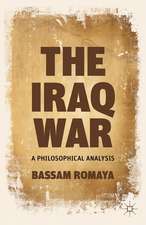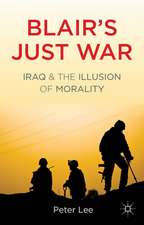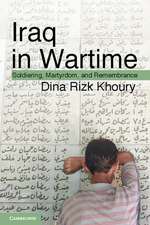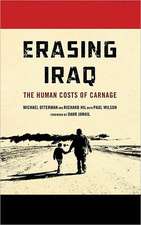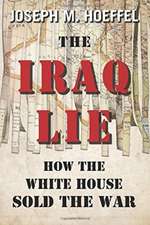The Legacy of Iraq
Editat de Benjamin Isakhanen Limba Engleză Paperback – 15 sep 2016
| Toate formatele și edițiile | Preț | Express |
|---|---|---|
| Paperback (1) | 161.54 lei 3-5 săpt. | |
| EDINBURGH UNIVERSITY PRESS – 15 sep 2016 | 161.54 lei 3-5 săpt. | |
| Hardback (1) | 552.68 lei 6-8 săpt. | |
| EDINBURGH UNIVERSITY PRESS – 30 iul 2015 | 552.68 lei 6-8 săpt. |
Preț: 161.54 lei
Preț vechi: 180.23 lei
-10% Nou
Puncte Express: 242
Preț estimativ în valută:
30.91€ • 33.57$ • 25.97£
30.91€ • 33.57$ • 25.97£
Carte disponibilă
Livrare economică 01-15 aprilie
Preluare comenzi: 021 569.72.76
Specificații
ISBN-13: 9781474417914
ISBN-10: 1474417914
Pagini: 288
Dimensiuni: 154 x 231 x 20 mm
Greutate: 0.44 kg
Editura: EDINBURGH UNIVERSITY PRESS
ISBN-10: 1474417914
Pagini: 288
Dimensiuni: 154 x 231 x 20 mm
Greutate: 0.44 kg
Editura: EDINBURGH UNIVERSITY PRESS
Notă biografică
Benjamin Isakhan is Associate Professor of Politics and Policy Studies and Director of the Middle East Studies Forum in the Alfred Deakin Institute at Deakin University, Australia. He is also Adjunct Senior Research Associate, Department of Politics and International Relations at the University of Johannesburg, South Africa and an Associate of the Sydney Democracy Network at the University of Sydney, Australia. He is the author of Democracy in Iraq: History, Politics and Discourse (Ashgate, 2012) and the editor of 6 books including The Edinburgh Companion to the History of Democracy (Edinburgh University Press, 2015 [2012]). Ben's current research includes a 3-year funded project entitled 'Measuring Heritage Destruction in Iraq and Syria'.
Cuprins
Part I: The Aftermath of War: Strategic Decisions and Catastrophic Mistakes
1.The De-Baathification of post-2003 Iraq: Purging the Past for Political Power
Benjamin Isakhan
2. The Contested Politics of Iraq's Oil Wealth
Philippe Le Billon
3. Torture at Abu Ghraib: Non-disclosure and Impunity
Aloysia Brooks
Part II: Iraqi Politics since Saddam
4.Shattering the Shia: A Maliki Political Strategy in Post-Saddam Iraq
Benjamin Isakhan
5. The Dangerous Legacy of a Flawed Constitution: Resolving Iraq's Kurdish 'Problem'
Liam Anderson
6. Between 'Aqalliya' and 'Mukawin': Understanding Sunni Political Attitudes in Post-Saddam Iraq
Ronen Zeidel
7. Post-Withdrawal Prospects for Iraq's 'Ultra-Minorities'
Nicholas Al-Jeloo
Part III: The Plight of Iraqi Culture and Civil Society
8. Doing Democracy in Difficult Times: Oil Unions and the Maliki Government
Benjamin Isakhan
9. 'If you are female, you risk being attacked': Digital Selves, Warblogs and Women's Rights in post-Invasion Iraq
Perri Campbell and Luke Howie
10. The Impact of Coalition Military Operations on Archaeological Sites in Iraq
Diane C. Siebrandt
Part IV: Regional and International Consequences of the Iraq War
11. Ethnic Cleansing in Iraq: Internal and External Displacement
Howard Adelman
12. The Shia Ascendency in Iraq and the Sectarian Polarisation of the Middle East
Ranj Alaaldin
13. Humanitarian Intervention after Iraq: The Politics of Protection and Rescue
Binoy Kampmark
14. Iraq, the Illusion of Security and the Limits to Power
Joseph A. Camilleri
Conclusion: The Iraq Legacies and the Roots of the 'Islamic State'
Benjamin Isakhan
Index
1.The De-Baathification of post-2003 Iraq: Purging the Past for Political Power
Benjamin Isakhan
2. The Contested Politics of Iraq's Oil Wealth
Philippe Le Billon
3. Torture at Abu Ghraib: Non-disclosure and Impunity
Aloysia Brooks
Part II: Iraqi Politics since Saddam
4.Shattering the Shia: A Maliki Political Strategy in Post-Saddam Iraq
Benjamin Isakhan
5. The Dangerous Legacy of a Flawed Constitution: Resolving Iraq's Kurdish 'Problem'
Liam Anderson
6. Between 'Aqalliya' and 'Mukawin': Understanding Sunni Political Attitudes in Post-Saddam Iraq
Ronen Zeidel
7. Post-Withdrawal Prospects for Iraq's 'Ultra-Minorities'
Nicholas Al-Jeloo
Part III: The Plight of Iraqi Culture and Civil Society
8. Doing Democracy in Difficult Times: Oil Unions and the Maliki Government
Benjamin Isakhan
9. 'If you are female, you risk being attacked': Digital Selves, Warblogs and Women's Rights in post-Invasion Iraq
Perri Campbell and Luke Howie
10. The Impact of Coalition Military Operations on Archaeological Sites in Iraq
Diane C. Siebrandt
Part IV: Regional and International Consequences of the Iraq War
11. Ethnic Cleansing in Iraq: Internal and External Displacement
Howard Adelman
12. The Shia Ascendency in Iraq and the Sectarian Polarisation of the Middle East
Ranj Alaaldin
13. Humanitarian Intervention after Iraq: The Politics of Protection and Rescue
Binoy Kampmark
14. Iraq, the Illusion of Security and the Limits to Power
Joseph A. Camilleri
Conclusion: The Iraq Legacies and the Roots of the 'Islamic State'
Benjamin Isakhan
Index




